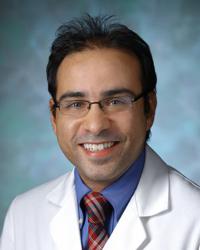Research Lab Results
-
Neuro-Vestibular and Ocular Motor Laboratory
In our laboratory we study the brain mechanisms of eye movements and spatial orientation. -How magnetic stimulation through transcranial devices affects cortical brain regions -Neural mechanisms underlying balance, spatial orientation and eye movement -Mathematical models that describe the function of ocular motor systems and perception of spatial orientation -Short- and long-term adaptive processes underlying compensation for disease and functional recovery in patients with ocular motor, vestibular and perceptual dysfunction Developing and testing novel diagnostic tools, treatments, and rehabilitative strategies for patients with ocular motor, vestibular and spatial dysfunction
-
Neuromodulation and Advanced Therapies Center
We investigate the brain networks and neurotransmitters involved in symptoms of movement disorders, such as Parkinson's disease, and the mechanisms by which modulating these networks through electrical stimulation affects these symptoms. We are particularly interested in the mechanisms through which neuromodulation therapies like deep brain stimulation affect non-motor brain functions, such as cognitive function and mood. We use imaging of specific neurotransmitters, such as acetylcholine and dopamine, to understand the changes in brain chemistry associated with the clinical effects of deep brain stimulation and to predict which patients are likely to have changes in non-motor symptoms following DBS. Through collaborations with our neurosurgery colleagues, we explore brain function by making recordings during DBS surgery during motor and non-motor tasks. Dr. Mills collaborates with researchers in the Department of Neurosurgery, the Division of Geriatric and Neuropsychiatry in the Department of Psychiatry and Behavioral Sciences and in the Division of Nuclear Medicine within the Department of Radiology to translate neuroimaging and neurophysiology findings into clinical applications.
-
Miho Iijima Laboratory
The Miho Iijima Laboratory works to make a further connection between cells' signaling events and directional movement. Our researchers have identified 17 new PH domain-containing proteins in addition to 10 previously known genes in the Dictyostelium cDNA and genome database. Five of these genes contain both the Dbl and the PH domains, suggesting these proteins are involved in actin polymerization. A PTEN homologue has also been identified in Dictyostelium that is highly conserved with the human gene. We are disrupting all of these genes and studying their roles in chemotaxis. -
Motion Analysis Laboratory
Our team is focused on understanding how complex movements are normally learned and controlled, and how damage to specific brain areas impairs these processes. We employ several techniques to quantify movement including: 3-dimensional tracking and reconstruction of movement, recordings of muscle activity, force plate recordings, and calculation of joint forces and torques. These techniques allow for very precise measurements of many different types of movements including: walking, reaching, leg movements, hand movements and standing balance. All studies are designed to test specific hypotheses about the function of different brain areas, the cause of specific impairments and/or the effects of different interventions. -
Mahendra Damarla Lab
Work in the Mahendra Damarla Lab focuses primarily on the field of vascular biology. Much of our research involves exploring alternatives to mechanical ventilation as a therapy for acute lung injury. We investigate mitogen-activated protein kinase-activated protein kinase 2 as a method to mediate apoptosis during lung vascular permeability by regulating movement of cleaved caspase 3. We have also conducted research on the prevalence of confirmatory tests in patients hospitalized with congestive heart failure or chronic obstructive pulmonary disease (COPD).


